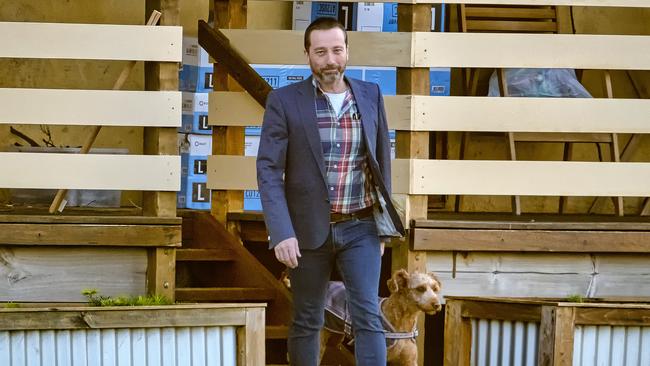Daniel Andrews’ spin doctor writes the playbook
Dozens of ‘cabinet in confidence’ emails expose how the Andrews government spends millions of dollars to find out what Victorians think about its pandemic performance.

Sue Loukomitis’s email hits Lissie Ratcliff’s inbox at 3.26pm on a Monday in May last year.
The QDOS research director’s message contains a link to that night’s focus group so Ratcliff, Premier Dan Andrews’s chief of staff, and other members of his private office can watch the session.
“Hi (redacted) and Lissie, here’s the Zoom link for tonight’s group (females living in South Yarra),” Loukomitis writes on May 25.
She then indicates the “SY females” would not be told the identities of the influential Andrews government observers. “Our office will de-identify you and keep your mics/cameras off, but let me know if you’d rather have your cameras on. Either way, I’ll just mention we have observers,” the QDOS executive tells Ratcliff in the email.
Another member of the Premier’s private office, whose identity has been redacted, emails Loukomitis back: “Really OK to keep my camera off Sue!”
Loukomitis responds: “Hah! We’ll stick with Plan A then.”
Loukomitis, two days later, sends another email to Ratcliff and Jeremi Moule, then the Premier’s deputy secretary and now his top public servant, and Genevieve Dolan, the Premier’s executive director strategic communication. In it, she provides links to the previous night’s focus group session on “Dandenong females” and “Dandenong males”.
The exchanges about “SY females” and “Dandy females” and “Dandy males” are in three partially censored emails released to The Australian under Freedom of Information laws.
The emails, dated May and June of 2020, offer an insight into the close working relationship between QDOS – owned and operated by Labor strategist John Armitage – and the Premier’s private office.
They go some way to explaining Armitage’s significant role in the Premier’s relentless and secretive information-gathering operation, which, based on these and other emails, was used from the beginning of the Covid-19 pandemic right through the second wave and the 112-day lockdown.
Labor loyalist
The emails reveal some questions were designed to test community reaction to public health messages such as washing hands and getting tested. They also show several were political, framed around gauging support for the government’s handling of the pandemic including leadership, and the reaction to lockdown measures.
Armitage is more than a Labor loyalist – he doesn’t just wear his Labor heart on his sleeve, he wraps himself in a class-war battle flag as he goes about helping the Premier read, perhaps even steer, the mood of Victorians.

Along the way, the veteran Labor strategist pockets millions of dollars from taxpayers – half of it handed to him by the Premier’s department without a competitive tender – proving that left-wing activism can also be a nice earner.
Asked to describe himself in an online post entitled “John on John”, the Labor pollster declares: “I’m a paid-up and proud union member – even though I’m self-employed. That’s ’cos I’m a lefty and fair dinkum about it.”
Asked to describe the value he brings to clients, Armitage says: “If my research says the public isn’t open to their client’s message, they say ‘Thanks for that John, very interesting. Now go back out there and find out how to change their minds.’ ”
There is no confidence deficit with the founder, owner and sole director of QDOS Research, which since 2016 has been paid more than $2m by the Department of Premier and Cabinet to run a top-secret program monitoring the views of Victorians.
Under the radar
Andrews and Armitage came into each other’s orbit in the early 2000s when the Premier was the assistant state secretary of the Victorian ALP, and QDOS’s chief was doing focus groups and other strategy work for the party.
“He’s been Dan’s guy for years,” one Labor figure remarked about the long-running but, until recently, under-the-radar political team.
After Andrews was elected Premier in 2014, Armitage moved from the Labor payroll to the public purse. As previously reported by The Australian, the Premier’s department has awarded him two contracts, the second without a competitive tender, to run a highly classified project to monitor the views of Victorians.
In May 2016, QDOS was awarded a $1,155,000 contract that expired in June 2018. In December 2019, QDOS was handed a second contract, worth $1,122,917. That contract expires in October 2022, weeks before the next election.
It was around 2016 that QDOS also started picking up a range of other consultancies from government departments and agencies. The Australian has confirmed at least 12 consultancies covering the environment, education, planning, local government, policing and the Premier’s signature level crossing removal project were awarded to QDOS.
Most of the contracts were valued between $30,000 and $80,000, but some of the agencies have refused to detail the value of the taxpayer-funded contracts. The cabinet-in-confidence stamp applied to the QDOS reports means they can be kept secret. But not even everyone in the cabinet sees them. They are more tightly held, with some former ministers speculating that only the Premier, his private office and a very small number of ministers have access to the data.
Two documents, both published in 2018 and dwelling in the bowels of the internet, do provide a form of genomic sequencing to Armitage’s political beliefs and values, and perhaps what informs his confidential advice to the Premier.
Golden formula
A 100-page report entitled Economic Message Project, co-authored by Armitage, maps out a manifesto for a successful left-wing political operation.
“We have explored and made recommendations about different narrative constructions and framing and tested them for their effect in persuading people to prefer progressive economic ideas and outcomes,” the report states.
“We do need to provide a positive image of a capable, competent, caring government – especially using specific examples, not general assertions.
“We need to show people a system which will work for them, much more than show that the current system doesn’t work.
“We should talk about economic policies in terms of government activity and its outcomes, not the financing of government activity.”
A section headlined “Golden formula for storytelling” lays out four secrets to a successful Labor message:
1) A great life for everyone is our shared goal;
2) Corporations (greed and self-interest) often get in the way of that;
3) A government based on equity and fairness is the best way to make sure everyone has a great life;
4) Everyone can have a great life if we have an active, democratic government.
In another section, headed “things to do”, Armitage and his co-authors, set out five steps to success:
1) Talk about the better life we can have (don’t rest your case on evidence the life we have is bad);
2) Tell people what they get (not how to get it);
3) Show people how your idea helps (not how much it costs);
4) Show the reality of corporate power in action preventing this;
5) Show government as caring, capable, and competent to create/provide/deliver the outcome.
Recommendations
The Andrews government’s May budget with its $3.8bn payroll tax hit on big business was consistent with the language in the Armitage report. While it can’t be said with any certainty that QDOS intelligence informed the budget measure, it can be said with absolute certainty that it was faithful to the QDOS political playbook.
Armitage and his co-authors make a series of recommendations in the report:
• Talk about the cake, not the recipe; the outcome, not the process; the destination, not the journey; put the product on the package, not the instructions. Show people the reward, not the hard work!
• Talk about the benefit a person actually receives. Do not talk in dollar value: “Time to read to your child before bed”, not “$49 extra so you don’t have to work as much”. If it costs a lot, chances are the price isn’t the most impressive feature.
• “A quicker, more comfortable journey to work”, not a “record $500m investment in rail infrastructure”.
• “Don’t put a $ on a hospital or a school, let alone a patient’s health or the answer to a child’s question.”
Signpost strategy
This messaging is echoed in aspects of the Andrews government’s communications strategy. For instance, the signage along the West Gate Tunnel project states “20 minutes saved” rather than the multibillion-dollar price tag.
Similarly, the level crossing removals are sold as promoting a safer and quicker drive.
Armitage advises his clients to use plain-speaking to get their message across, and while Labor figures say Andrews has developed his own messaging, there is a commonality between that and the advice from his spin doctor.
For his part, when grilled about his association with QDOS, Andrews has declared: “I’m no Manchurian candidate.”
The 100-page report states: “Focus on result, not process. Be specific and direct: Make corporations pay more tax (specific), not ‘make corporations pay their fair share’ (open to interpretation).”
Among the questions asked was this one: “Wealthy people achieved their success because they … worked harder or were smarter than others (or) were given more opportunities than others” – 54 per cent of respondents supported the latter answer, according to the report.
A separate, 21-page report for the Economic Message Project provides further insight into the nature of the advice he provides for clients.
A section in the report headed “change the economy … what the heck does that mean?” points to Armitage’s political and economic core values and thirst for class war.
“Most people see the economy as out of their control, either as something existing in the background like the weather or as force to which they were subservient or even a beast they need to feed,” the report states.
“One way of looking at it is that people only see the economy in a vertical way. It is either going up or down. We might add velocity to this. It is going up or down faster or slower.
“What we want is for people to know that the economy can be changed horizontally i.e. that we can shift more of the good things in life in their direction instead of these things being hoarded by the super-wealthy and corporate elite.
“We can probably be reasonably confident that if people were just aware of the possibility of horizontal adjustments to the economy, they would not only support but demand and ultimately get the sort of structural economic changes that we would like to see.”
Armitage admits in the report that selling “horizontal economic change” can be “tricky”.
“One idea would be to test some tangible examples leveraging nice homespun logic that everyone can get their heads around. For example: ‘If wages for ordinary people went up, then we would spend more in shops and the shops would be better off and employ more workers. Everyone wins.’ ”
Armitage makes the case that fanning the flames of class war can be a useful political tactic.
“If we really want to put the acid on … maybe we should try something like this: ‘You don’t hear about many strikes these days. That’s because workers no longer have the right to strike for better pay and conditions or even better safety in just about every situation. The bosses now have the whip hand. No wonder the wages of working people have been the same for years as the cost of living goes up and up. ‘If we had the right to strike, you can bet the corporations would take a bit more interest in fair pay and conditions for working people.’ ”




To join the conversation, please log in. Don't have an account? Register
Join the conversation, you are commenting as Logout